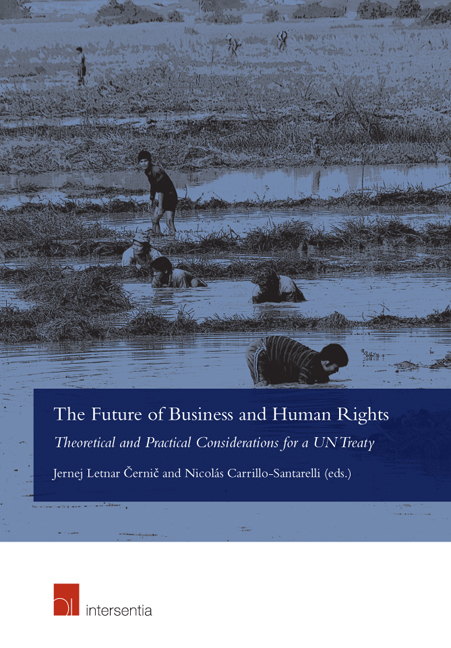Book contents
- Frontmatter
- Dedication
- Acknowledgements
- Contents
- About the Contributors
- Introduction
- Part I The Convenience and Possibility of Adopting a Treaty on Business and Human Rights
- Part II Critical Analyses Of A Treaty On Business And Human Rights
- Part III Regional Approaches
- Business and Human Rights in the Americas: Defining a Latin American Route to Corporate Responsibility
- The Applicability of Human Rights Treaties to Business Enterprises: A Case Study of India
- Reckless Business: Corporate Accountability for Atrocities
- European Perspectives on the Business and Human Rights Treaty Initiative
- PART IV Lessons from other Regimes of International Law
- Conclusion
- Index
Business and Human Rights in the Americas: Defining a Latin American Route to Corporate Responsibility
from Part III - Regional Approaches
Published online by Cambridge University Press: 11 October 2018
- Frontmatter
- Dedication
- Acknowledgements
- Contents
- About the Contributors
- Introduction
- Part I The Convenience and Possibility of Adopting a Treaty on Business and Human Rights
- Part II Critical Analyses Of A Treaty On Business And Human Rights
- Part III Regional Approaches
- Business and Human Rights in the Americas: Defining a Latin American Route to Corporate Responsibility
- The Applicability of Human Rights Treaties to Business Enterprises: A Case Study of India
- Reckless Business: Corporate Accountability for Atrocities
- European Perspectives on the Business and Human Rights Treaty Initiative
- PART IV Lessons from other Regimes of International Law
- Conclusion
- Index
Summary
INTRODUCTION
Since the endorsement of the Guiding Principles on Business and Human Rights (hereinafter the ‘Guiding Principles’ or the ‘UNGPs’) by the UN Human Rights Council in 2011, several voices have called for the development of binding standards to regulate corporate conduct in the field of human rights. Although businesses generally tend to have a positive impact on social and economic development, the negative consequences of their activities need to be addressed in order to protect human rights, especially of the most vulnerable groups in society. An important global movement in favour of corporate responsibility in the field of human rights, based on the UNGPs and other international instruments and led mostly by some developed economies, has nevertheless had a relatively low impact in the areas where such rules are required the most: in developing countries. It is precisely in some of these countries – and notably in Ecuador, where the activities of national and foreign oil companies have had a severe impact on the environment and local communities – that such abuses have led to a call to develop stronger human rights obligations for corporations.
Different areas of Africa, Asia and Latin America are among the regions where such standards have yet to make an important – or even significant – impact. Particularly in the case of Latin America, the UNGPs are just starting to become referred to by governments and companies, despite the support received in the process leading to their adoption in 2011. This situation has been generally reflected in the process related to the establishment of the Open-ended Intergovernmental Working Group on transnational corporations and other business enterprises with respect to human rights, and later on during its two initial sessions. It is therefore necessary to scale up the efforts in the region to ensure that corporations respect human rights and that States are aware of their duties under international human rights law; such efforts, however, need to be implemented both nationally and regionally if progress is to be achieved.
This chapter, divided into three substantive sections, will first address the position of Latin American States regarding the treaty process, including during the initial two sessions of the Intergovernmental Working Group.
- Type
- Chapter
- Information
- The Future of Business and Human RightsTheoretical and Practical Considerations for a UN Treaty, pp. 163 - 184Publisher: IntersentiaPrint publication year: 2018



